Charles E W Bean, Diaries, AWM38 3DRL 606/142/1 - September 1916 - Part 1
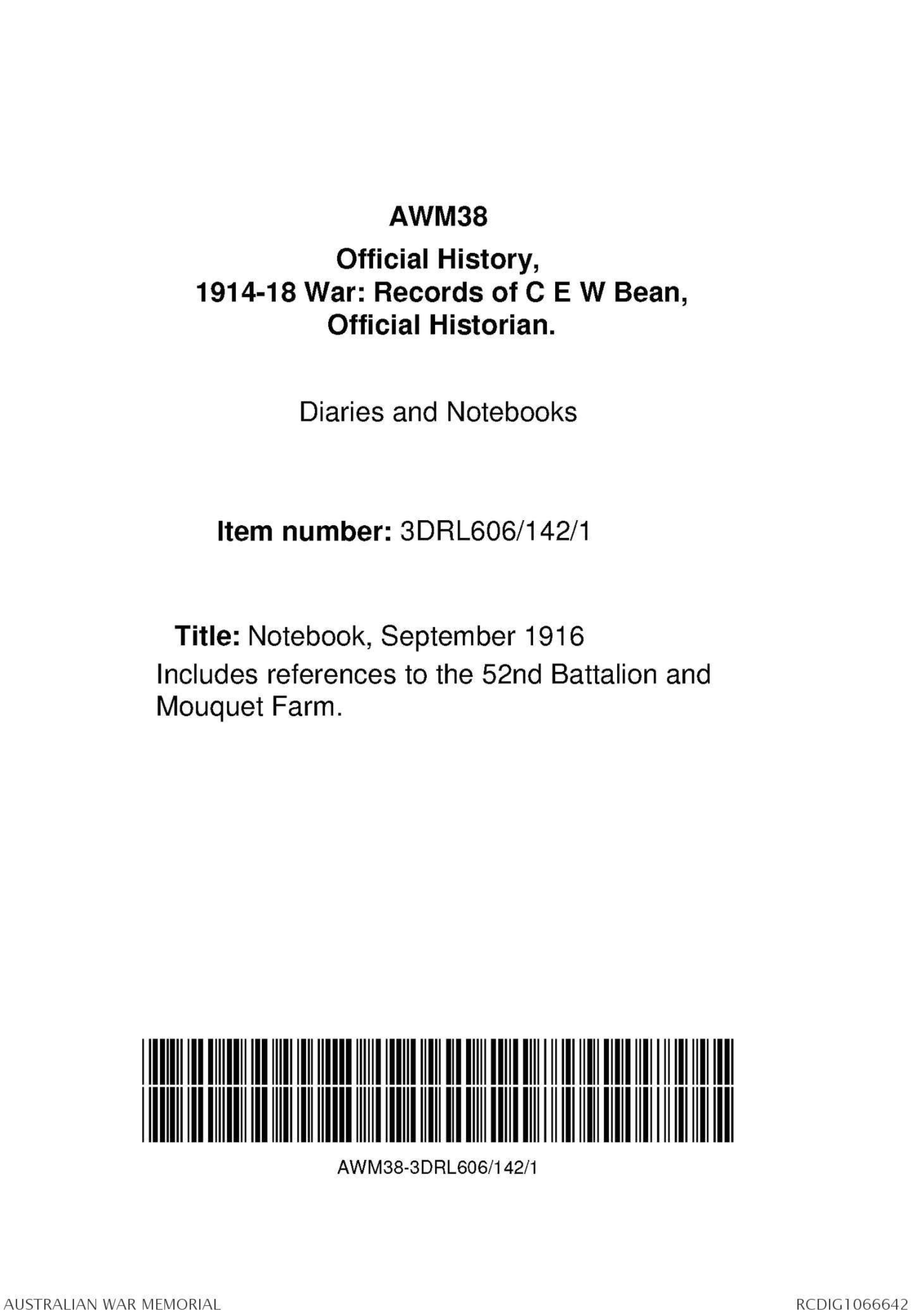
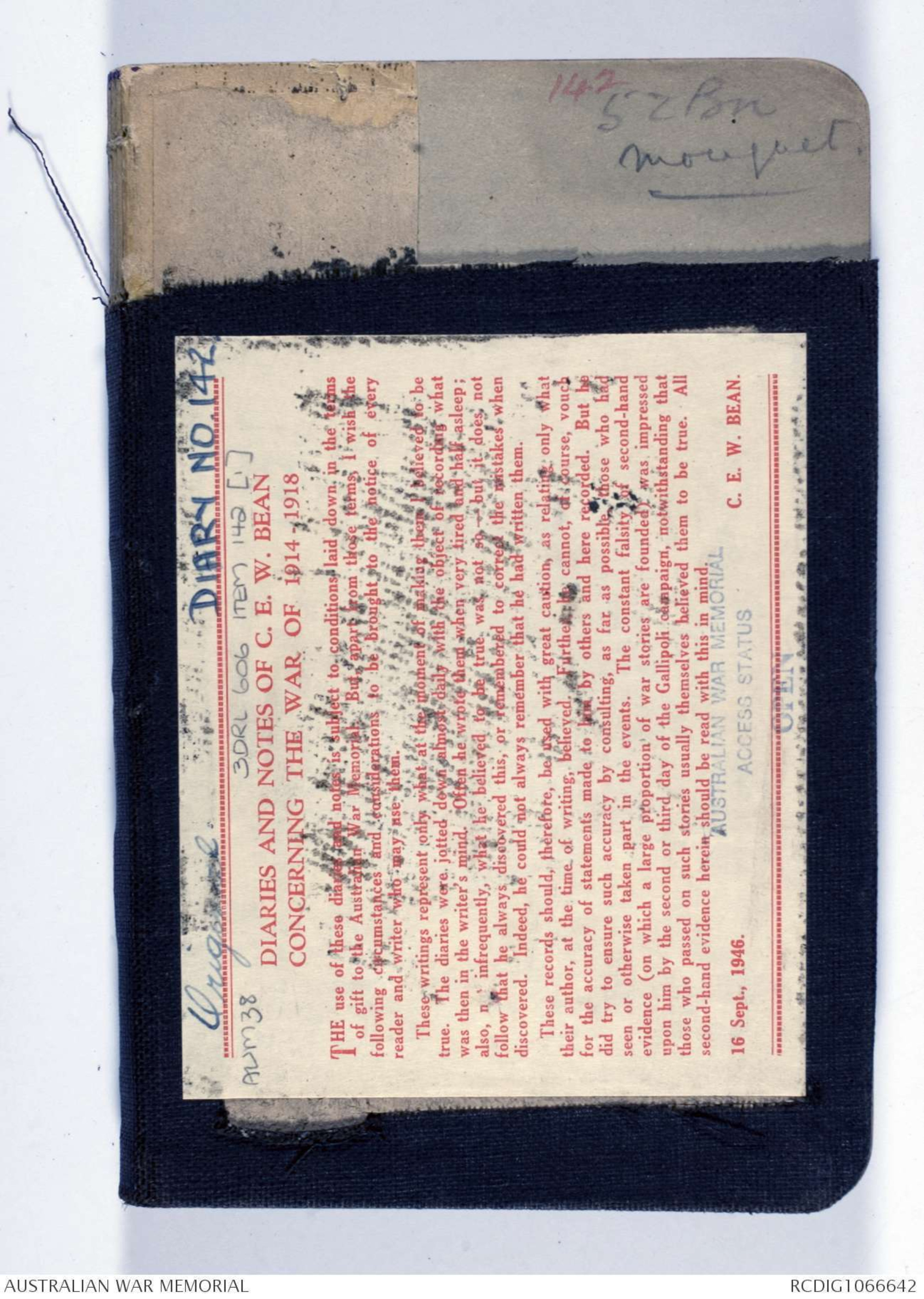
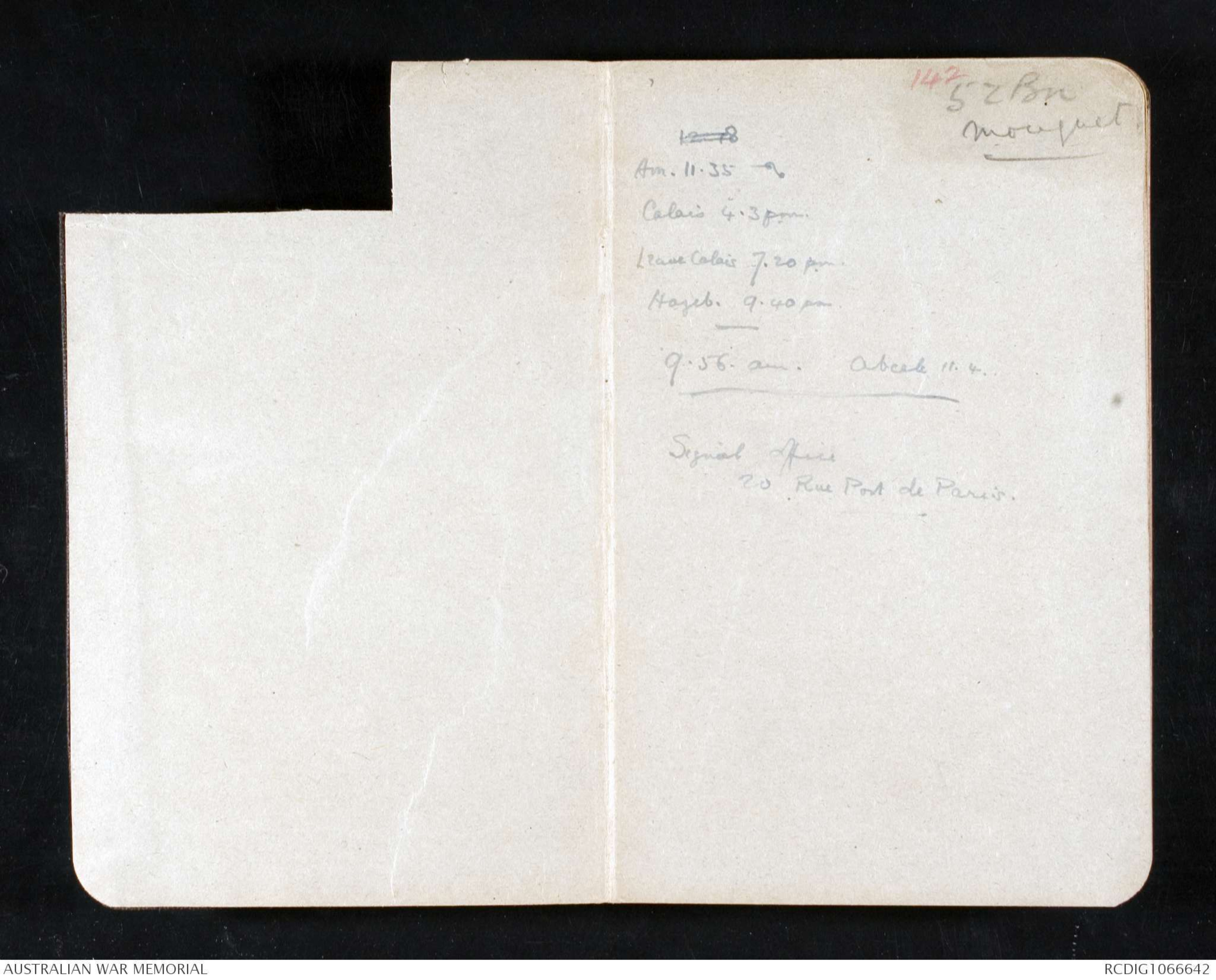
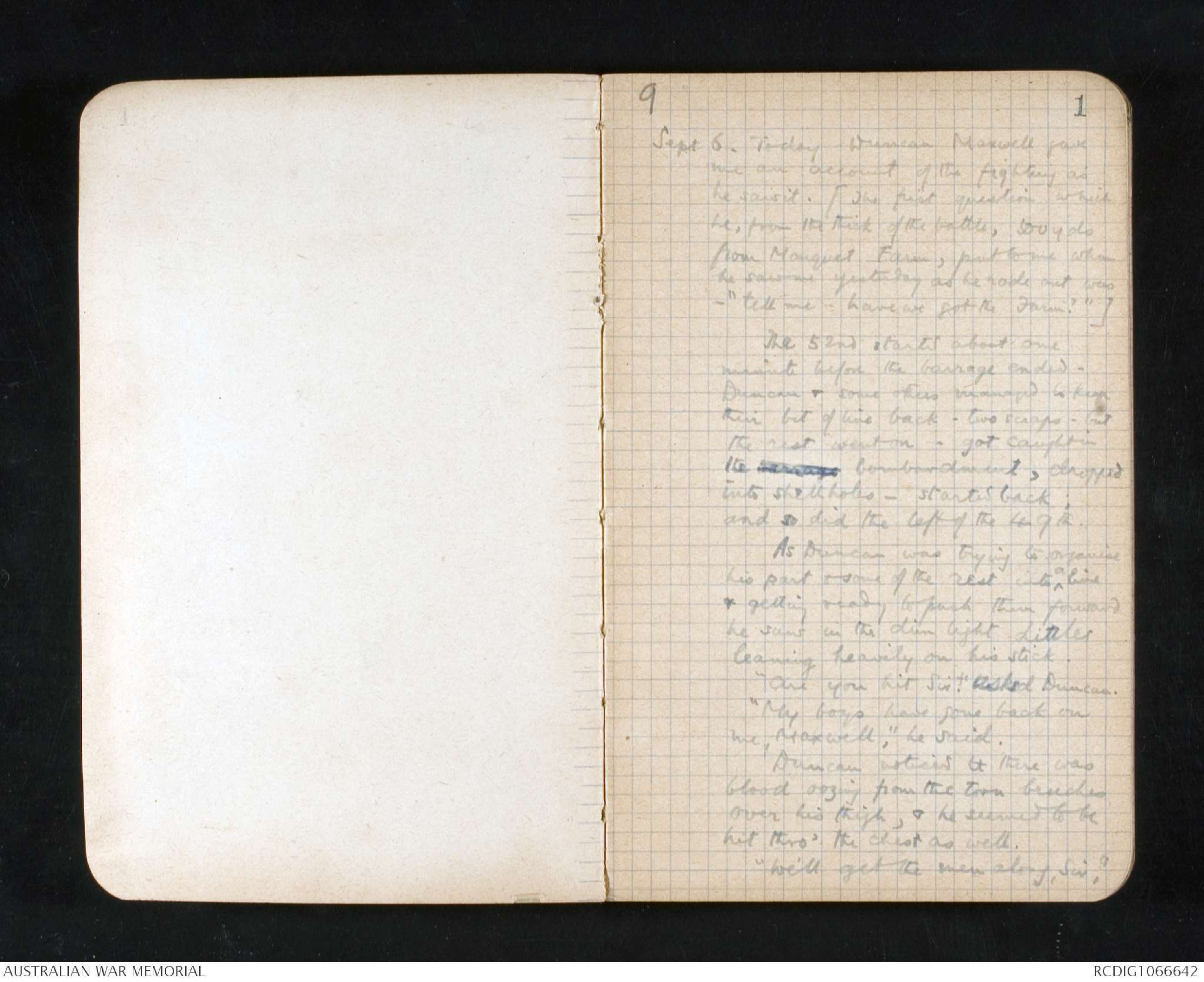
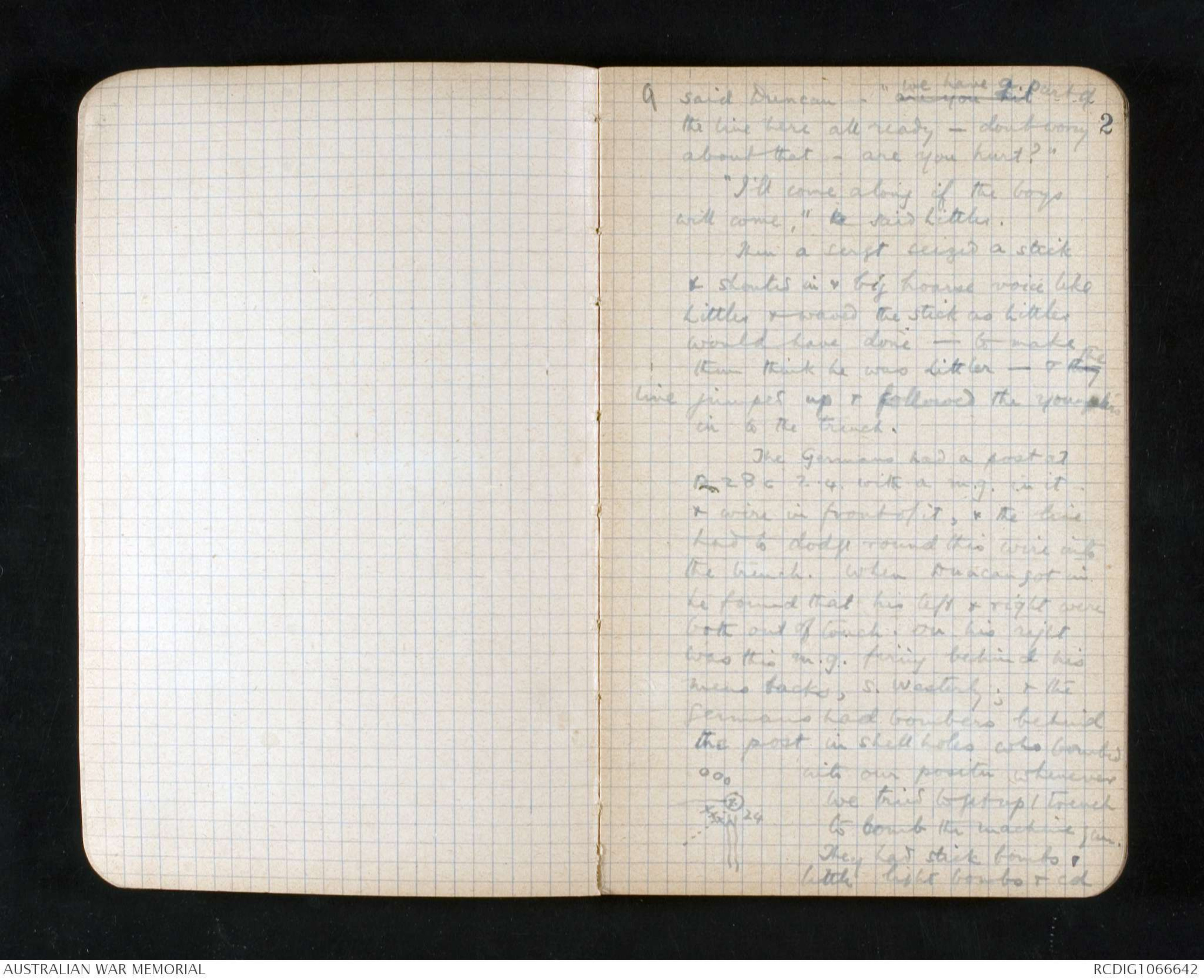
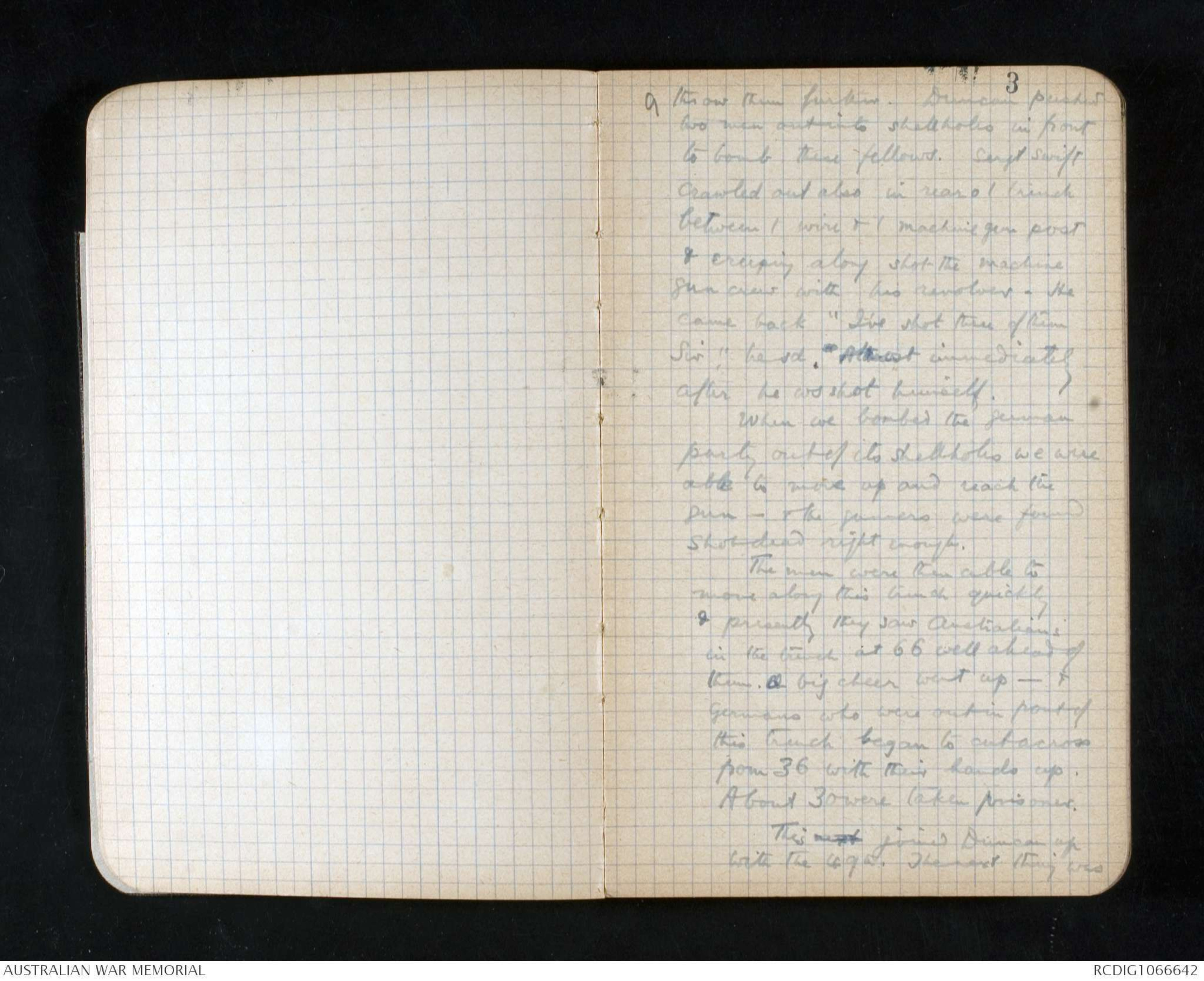
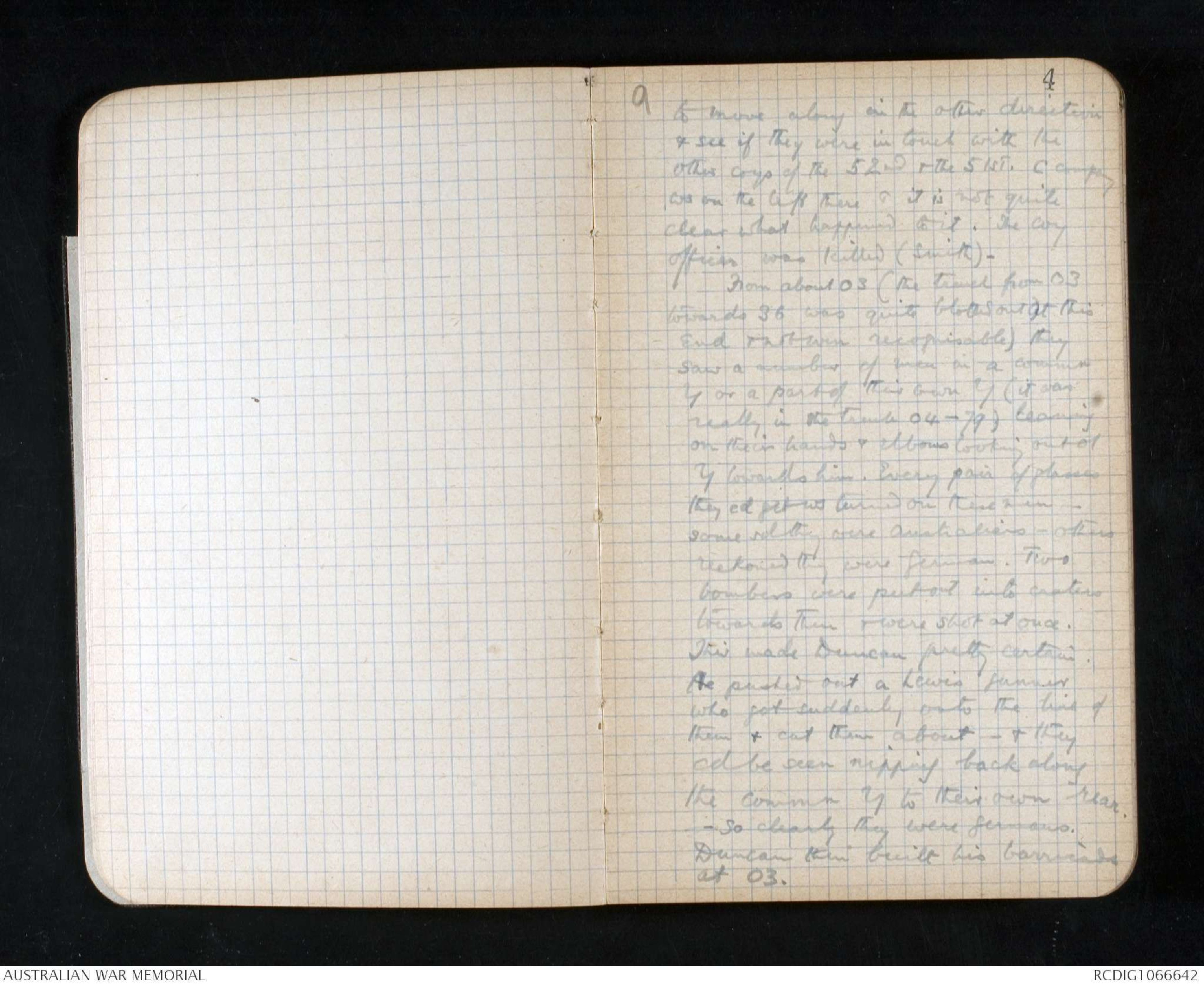
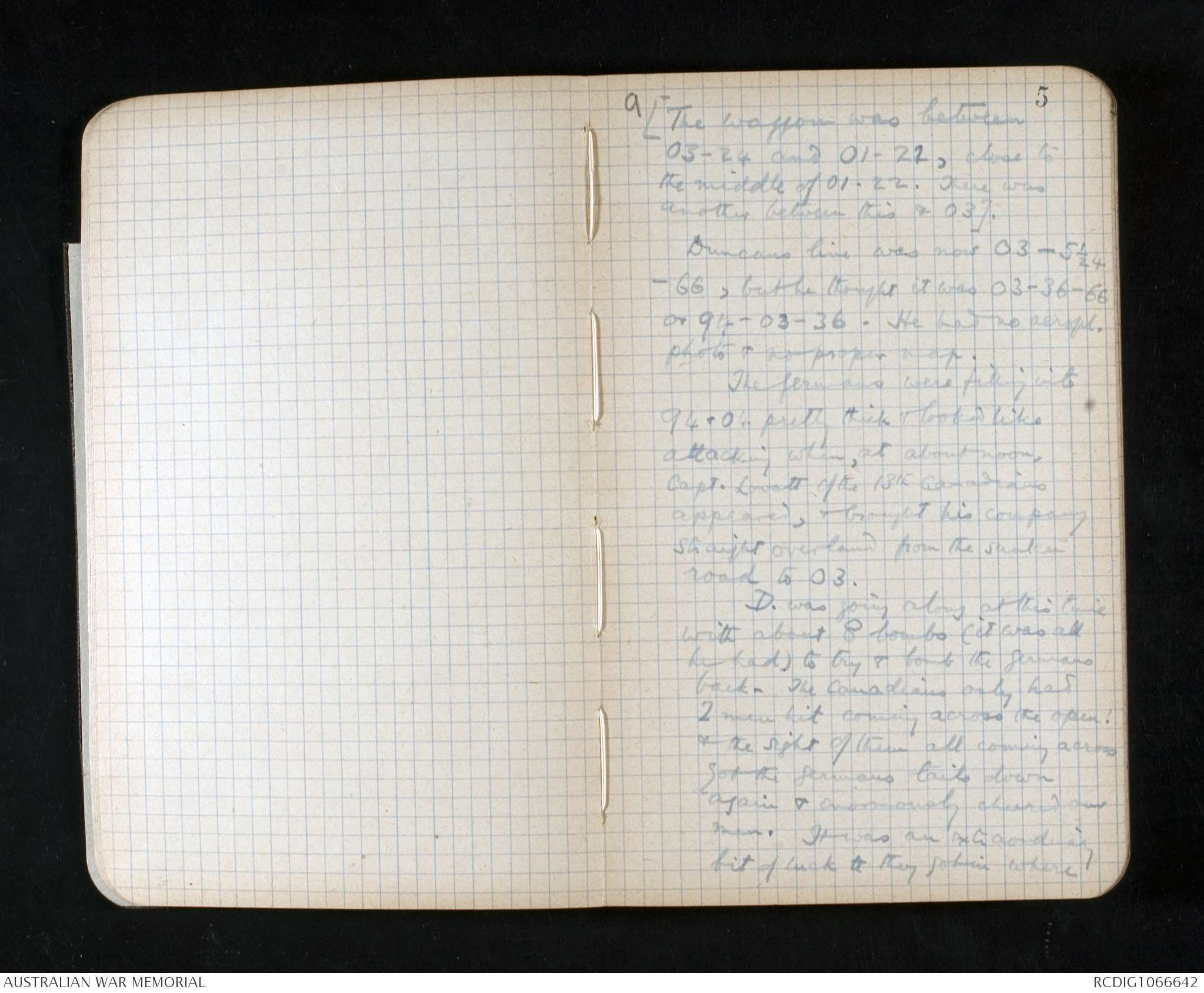
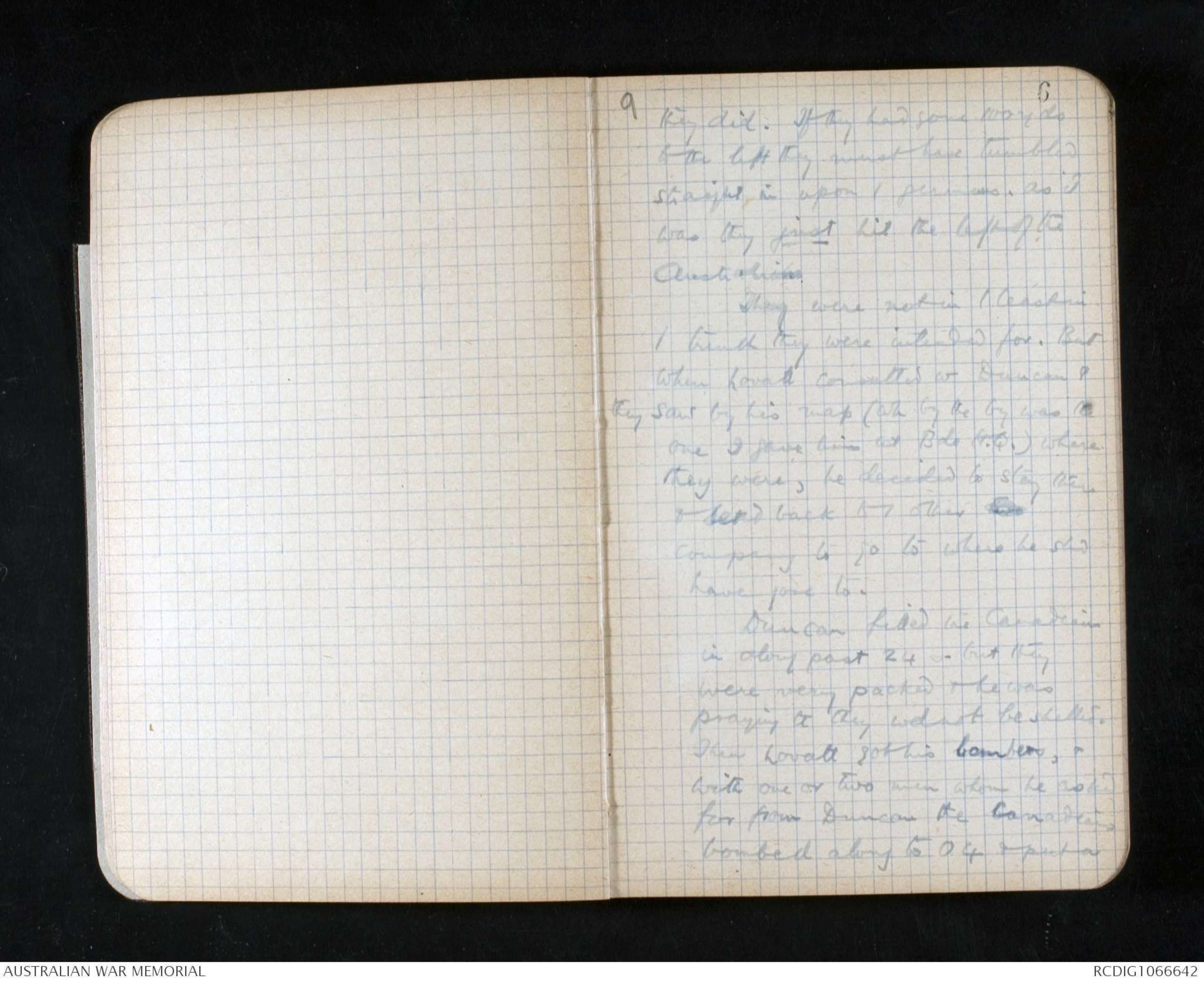
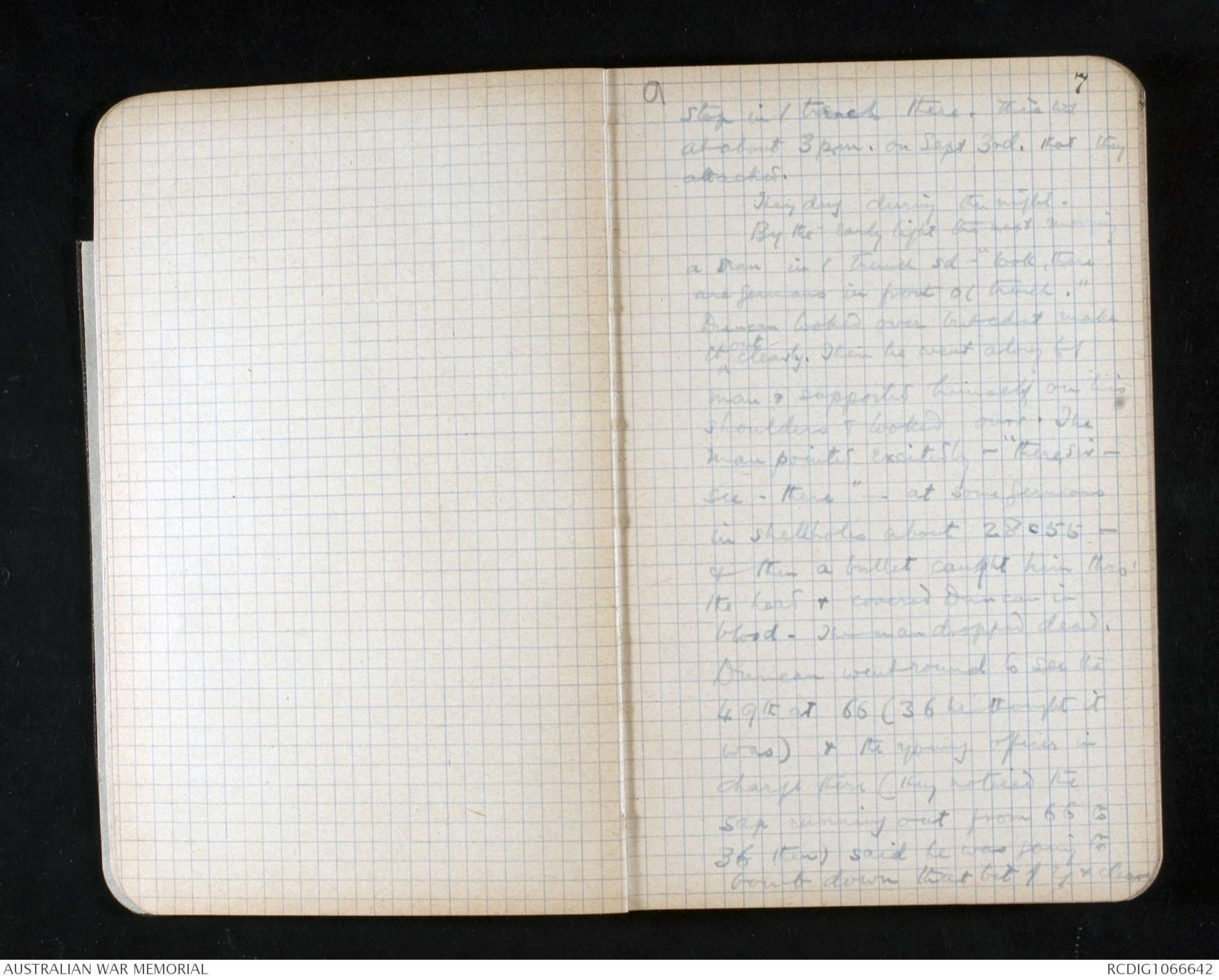
AWM38
Official History,
1914-18 War: Records of C E W Bean,
Official Historian.
Diaries and Notebooks
Item number: 3DRL606/142/1
Title: Notebook, September 1916
Includes references to the 52nd Battalion and
Mouquet Farm.
AWM38-3DRL606/142/1
[*142
52 Bn
Mouquet*]
Original Diary No. 142
AWM38 3DRL 606 ITEM 142 [1]
DIARIES AND NOTES OF C. E. W. BEAN
CONCERNING THE WAR OF 1914 - 1918
THE use of these diaries and notes is subject to conditions laid down in the terms
of gift to the Australian War Memorial. But, apart from those terms, I wish the
following circumstances and considerations to be brought to the notice of every
reader and writer who may use them.
These writings represent only what at the moment of making them I believed to be
true. The diaries were jotted down almost daily with the object of recording what
was then in the writer's mind. Often he wrote them when very tired and half asleep;
also, not infrequently, what he believed to be true was not so – but it does not
follow that he always discovered this, or remembered to correct the mistakes when
discovered. Indeed, he could not always remember that he had written them.
These records should, therefore, be used with great caution, as relating only what
their author, at the time of writing, believed. Further, he cannot, of course, vouch
for the accuracy of statements made to him by others and here recorded. But he
did try to ensure such accuracy by consulting, as far as possible, those who had
seen or otherwise taken part in the events. The constant falsity of second-hand
evidence (on which a large proportion of war stories are founded) was impressed
upon him by the second or third day of the Gallipoli campaign, notwithstanding that
those who passed on such stories usually themselves believed them to be true. All
second-hand evidence herein should be read with this in mind.
16 Sept., 1946. C. E. W. BEAN
AUSTRALIAN WAR MEMORIAL
ACCESS STATUS
OPEN
142
52 Bn
Mouquet12.18
Am. 11.35 express
Calais 4.3 p.m.
Leave Calais 7.20 p.m.
Hazeb. 9.40 pm.
9.56. am. [[Abeak?]] 11.4
Signal office
20 Rue Port de Paris.
9 1
Sept 6. Today Duncan Maxwell gave
me an account of the fighting as
he saw it. [The first question which
he, from the thick of the battle, 500 yds
from Mouquet Farm, put to me when
he saw me yesterday as he rode out was
– "tell me – have we got the Farm?"]
The 52nd started about one
minute before the barrage ended –
Duncan & some others managed to keep
their bit of line back – two scraps – but
the rest went on – got caught in
the barrage bombardment, dropped
into shellholes – started back;
and so did the left of the 49th.
As Duncan was trying to organise
his part & some of the rest into ^ a line
& getting ready to push them forward
he saw in the dim light Littler
leaning heavily on his stick.
"Are you hit Sir". asked Duncan.
"My boys have gone back on
me, Maxwell", he said.
Duncan noticed tt there was
blood oozing from the torn breeches
over his thigh, & he seemed to be
hit thro' the chest as well.
"We'll get the men along, Sir,"
9 2
said Duncan - "are you hit We have a part of
the line here all ready – dont worry
about that – are you hurt?"
"I'll come along if the boys
will come," he said Littler.
Then a sergt seized a stick
& shouted in a big hoarse voice like
Littler & waved the stick as Littler
would have done – to make
them think he was Littler – & they the
line jumped up & followed the youngsters
in to the trench.
The Germans had a post at
B 28 c 2.4 with a m.g. in it
& wire in front of it, & the line
had to dodge round this wire into
the trench. When Duncan got in
he found that his left & right were
both out of touch. On his right
was this m.g. firing behind his
mens backs, S. Westerly; & the
Germans had bombers behind
the post in shell holes who bombed
Diagram - see original document
into our positn whenever
we tried to get up / trench
to bomb the machine gun.
They had stick bombs &
little light bombs & cd
9 3
throw them further. Duncan pushed
two men out into shellholes in front
to bomb these fellows. Sergt Swift
crawled out also in rear o / trench
between / wire & / machine gun post
& creeping along shot the machine
gun crew with his revolver. He
came back "I've shot three of them
Sir", he sd. " Almost immediately
after he ws shot himself.
When we bombed the German
party out of its shellholes we were
able to move up and reach the
gun – & the gunners were found
shot dead right enough.
The men were then able to
move along this trench quickly
& presently they saw Australians
in the trench at 66 well ahead of
them. A big cheer went up – &
Germans who were out in front of
this trench began to cut across
from 36 with their hands up.
About 30 were taken prisoner.
This next joined Duncan up
with the 49th. The next thing was
9 4
to move along in the other direction
& see if they were in touch with the
other coys of the 52nd & the 51st. C company
ws on the left there & it is not quite
clear what happened to it. The coy
officer was killed (Smith) –
From about 03 (the trench from 03
towards 36 was quite blotted out at this
end & not even recognisable) they
saw a number of men in a commn
trench or a part of their own trench (it was
really in the trench 04 - 79) leaning
on their hands & elbows looking out o /
trench towards him. Every pair of glasses
they cd get ws turned on these men –
some sd they were Australians – others
reckoned they were German. Two
bombers were put out into craters
towards them & were shot at once.
This made Duncan pretty certain.
He pushed out a Lewis gunner
who got suddenly onto the line of
them & cut them about – & they
cd be seen nipping back along
the commn trench to their own rear.
– so clearly they were Germans.
Duncan then built his barricade
at 03.
9 5
[The waggon was between
O3-24 and O1-22, close to
the middle of O1-22. There was
another between this & O3].
Duncans line was now O3 – 5½ 4
– 66, but he thought it was O3–36–66
or 94–03–36. He had no aeropl.
photo & no proper map.
The Germans were filling into
94–04 pretty thick & looked like
attacking when, at about noon,
Capt. Lovatt of the 13th Canadians
appeared, & brought his company
straight overland from the sunken
road to O3.
D. was going along at this time
with about 8 bombs (it was all
he had) to try & bomb the Germans
back. The Canadians only had
2 men hit coming across the open!
& the sight of them all coming across
got the Germans tails down
again & enormously cheered our
men. It was an extraordinary
bit of luck tt they got in where
9 6
they did. If they had some 100 yds
to the left they must have tumbled
straight in upon / Germans. As it
was they just hit the left of the
Australians.
They were not in / least in
/ trench they were intended for. But
when Lovatt consulted with Duncan &
they saw by his map (wh by the by was the
one I gave him at Bde H.Q.) where
they were, he decided to stay there.
& send back to / other two
company to go to where he shd
have gone to.
Duncan filled the Canadians
in along post 24 – but they
were very packed & he was
praying tt they wd not be shelled.
Then Lovatt got his bombers, &
with one or two men whom he asked
for from Duncan the Canadians
bombed along to O.4 & put a
9 7
stop in / trench there. This ws
at about 3p.m. on Sept 3rd. that they
attacked.
They dug during the night.
By the early light the next morning
a man in / trench sd - "look there
are Germans in front o / trench."
Duncan looked over but cdnt make
it ^ out clearly. Then he went along to /
man & supported himself on his
shoulders & looked over. The
man pointed excitedly – "there, Sir –
see – there" – at some Germans
in shellholes about 28 c 55 –
& then a bullet caught him thro'
the head & covered Duncan in
blood. The man dropped dead.
Duncan went round to see the
49th at 66 (36 he thought it
was) & the young officer in
charge there (they noticed the
sap running out from 66 to
36 then) said he was going to
bomb down that bit of trench & clear
 Deb Parkinson
Deb ParkinsonThis transcription item is now locked to you for editing. To release the lock either Save your changes or Cancel.
This lock will be automatically released after 60 minutes of inactivity.